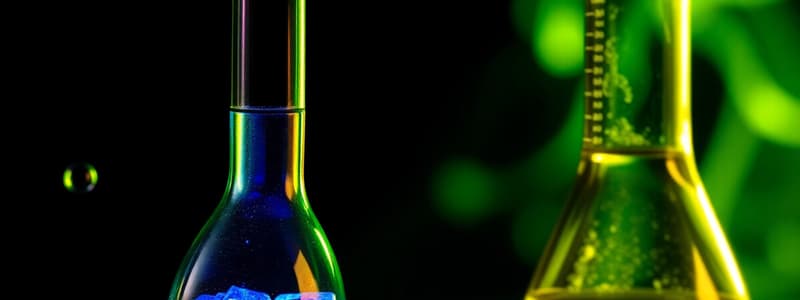Podcast
Questions and Answers
What does a positive change in enthalpy (ΔH) indicate about a reaction?
What does a positive change in enthalpy (ΔH) indicate about a reaction?
- The reactants have more energy than the products.
- Energy is released during the reaction.
- Energy is absorbed during the reaction. (correct)
- The temperature increases as products are formed.
In an exothermic reaction, which statement is true?
In an exothermic reaction, which statement is true?
- The change in enthalpy (ΔH) is positive.
- The products contain more energy than the reactants.
- Energy is released into the surroundings. (correct)
- The reaction feels cold.
What is meant by activation energy in a chemical reaction?
What is meant by activation energy in a chemical reaction?
- The total energy released from a reaction.
- The minimum energy required for reactants to collide successfully. (correct)
- The energy that remains after a reaction occurs.
- The energy absorbed by products during a reaction.
Which statement correctly describes the relationship between reactants and products in an endothermic reaction?
Which statement correctly describes the relationship between reactants and products in an endothermic reaction?
What is the role of a catalyst in a chemical reaction?
What is the role of a catalyst in a chemical reaction?
How does the temperature of a reaction typically change during an endothermic process?
How does the temperature of a reaction typically change during an endothermic process?
What is an activated complex in a chemical reaction?
What is an activated complex in a chemical reaction?
What is the effect of a catalyst on the heat of reaction (ΔH)?
What is the effect of a catalyst on the heat of reaction (ΔH)?
Flashcards are hidden until you start studying
Study Notes
Enthalpy
- Enthalpy (H) is the measure of heat energy.
- Change in enthalpy (ΔH) indicates the amount of energy absorbed or released during a reaction.
- ΔH = Hproducts – Hreactants
- Positive ΔH: energy is absorbed (endothermic)
- Negative ΔH: energy is released (exothermic)
Endothermic Reaction
- Heat (energy) is absorbed into the reaction.
- The reaction feels cold, temperature decreases.
- Products have higher energy than reactants.
- ΔH is positive.
Exothermic Reaction
- Heat (energy) is released from the reaction.
- The reaction feels hot, temperature increases.
- Reactants have higher energy than products.
- ΔH is negative.
Collision Theory
- Two atoms, ions, or molecules react to form products when they collide with enough energy.
- This energy is called the activation energy.
- It is the minimum energy required for colliding particles to react.
Activated Complex
- An unstable arrangement of atoms forms momentarily at the activation energy barrier.
- Also known as the transition state.
Catalyst
- A catalyst increases the rate of a reaction by lowering the activation energy barrier.
- It does not impact the heat of reaction (ΔH).
Studying That Suits You
Use AI to generate personalized quizzes and flashcards to suit your learning preferences.




